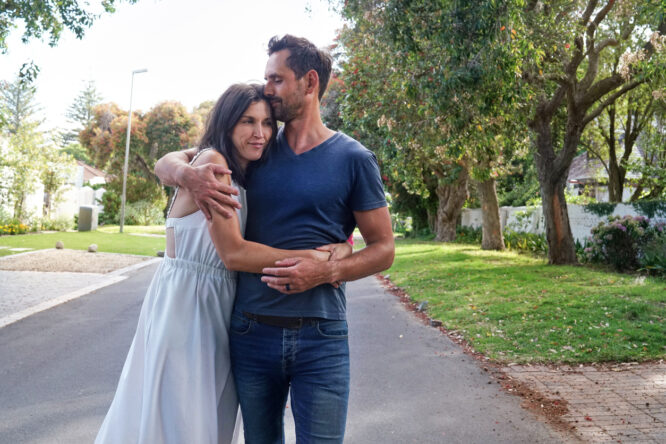Perfection doesn’t exist in life, and it certainly doesn’t exist in love.

We’re all flawed human beings, after all, and each of us has some not so great parts of ourselves that are a work in progress (and will probably stay that way for life). However, that doesn’t mean we’re not worthy of love, affection, and care. After all, real love isn’t about finding someone with no weaknesses or shortcomings. In reality, it’s about being fully seen, flaws and all, and still being chosen. When partners genuinely accept each other’s imperfections, it shows in the little, everyday ways.
1. They don’t try to fix each other.

When there’s true acceptance, there’s no constant need to change or improve the other person. Instead of offering unsolicited advice or trying to correct behaviours, they let each other be, knowing growth doesn’t come from pressure. That doesn’t mean they ignore hurtful or toxic patterns, but they definitely know how to separate quirks from real issues. They support growth, not perfection, and understand that love isn’t a self-improvement project.
2. They stop keeping score because they know it’s pointless.

In healthy relationships, acceptance leads to letting go of the scoreboard. They don’t track who messed up last or who owes who an apology. Mistakes happen, and they move on without dragging old missteps into new arguments. There’s an understanding that both will slip up sometimes. What matters is the mutual care, not constant fairness or payback. The relationship feels more like a team than a competition.
3. They can laugh at the weird stuff.

From awkward habits to odd routines, couples who accept each other’s flaws often find the humour in them. Instead of cringing or judging, they smile, laugh, and even playfully tease in a way that feels safe, not hurtful. That lightness builds connection. It’s not about mocking each other. It’s about saying, “I see your quirks, and they don’t scare me. I actually like them.”
4. They give each other space to be in a mood.

When someone’s having a bad day, partners who truly accept each other don’t immediately take it personally. They allow for off moods, quiet moments, or even irritability without jumping to conclusions. They don’t panic or assume something’s wrong with the relationship. They recognise that being human means having fluctuations, and not every dip in energy needs to be fixed or questioned.
5. They openly talk about uncomfortable stuff.

When acceptance is real, even the messy topics aren’t avoided. They talk about insecurities, fears, past mistakes, and habits they’re not proud of—because they feel safe doing so without fear of being judged. Their emotional honesty deepens the bond. It’s not about always agreeing or liking everything that’s shared—it’s about showing up with openness instead of hiding parts of yourself out of shame.
6. They’re patient with each other’s growth.

Personal change isn’t instant. One partner might struggle with defensiveness, procrastination, or trust issues, but their person stays supportive instead of demanding perfection right away. Having that level of patience sends a powerful message: “I know you’re trying, and I’ll be here while you figure it out.” Such steady support builds real emotional safety as time goes on, and isn’t that what we all want?
7. They stop expecting each other to be mind readers.

They realise that love doesn’t mean automatically knowing what the other is feeling or needing. Instead of getting upset over missed signals, they express things clearly and kindly. That change brings more ease into the relationship. They understand that no one is perfect at communication, and making space for each other’s learning curves is part of accepting the whole person.
8. They allow each other to be imperfect in front of other people.

When one partner fumbles socially, forgets something, or gets awkward, the other doesn’t jump in to correct or cover for them. They let them be fully themselves, even when it’s not polished. After all, who cares? Instead of embarrassment, there’s pride. They don’t need their partner to “perform” in public because they know real connection comes from being real, not flawless.
9. They don’t weaponise flaws in arguments.

When things get tense, they don’t throw past mistakes or personal traits into the fight to win. They fight fair, even when they’re frustrated because they respect each other’s dignity. True acceptance means not using vulnerabilities as ammunition. It means keeping the argument about the issue, not the person, and knowing when to let things go instead of digging in.
10. They celebrate each other’s weird passions.

Even if they don’t share the same interests, they’ll ask questions, show support, or just smile while their partner geeks out about something random. The joy their partner feels becomes reason enough to care. That kind of interest says, “I might not fully get it, but I love that it lights you up.” It’s not about shared hobbies; it’s about shared joy, and feeling seen in your odd little world.
11. They don’t get defensive when flaws are gently brought up.

Being called out, even kindly, is never easy. But couples who truly accept each other don’t instantly push back or get offended. They listen, take it in, and try to understand instead of deflecting. The openness comes from knowing they’re loved even with their flaws. So being told something hard doesn’t feel like rejection. It feels like growth being offered from a place of care.
12. They stop comparing each other to other couples.

When acceptance is strong, the relationship doesn’t need to live up to outside standards. They stop measuring their connection against how other people behave or show love, and instead focus on what works for them. Unsurprisingly, it helps them relax into their own rhythm. They’re not chasing someone else’s version of perfect. They’re building something authentic, even if it looks a little different from the norm.
13. They offer grace during emotional messiness.

Whether it’s anxiety, insecurity, or just being overwhelmed, they don’t shame each other for being emotionally messy. Instead of retreating or reacting, they offer presence, gentleness, and patience. It’s not about always knowing what to say. It’s about staying close when things are hard. They make it safe to fall apart without fear of losing love or being seen as “too much.”
14. They show up consistently, even when it’s not convenient.

They don’t just support each other when things are going smoothly. They keep showing up even when moods are low, plans fall through, or the relationship feels less “cute” than it used to. Such steady presence builds trust. When someone chooses you even on your worst days, it reinforces that your flaws aren’t dealbreakers—they’re simply part of the picture.
15. They laugh about mistakes instead of making them a big deal.

They spill something, forget a birthday, or say the wrong thing, and instead of turning it into a crisis, they laugh together. Their connection has enough space to hold those imperfect moments with lightness. That humour softens the sharp edges of life. It makes room for forgiveness without fanfare and reminds both people that mistakes are just part of being human, not signs of failure.
16. They love each other as-is, not as a potential.

They’re not waiting for their partner to be more ambitious, more emotionally open, or more “together.” They love who’s in front of them now—not some version they hope will appear down the road. That kind of love doesn’t mean settling. It means seeing the full picture—the good, the rough, the growing edges—and still saying, “You’re enough, right now.” That’s real acceptance in action.




